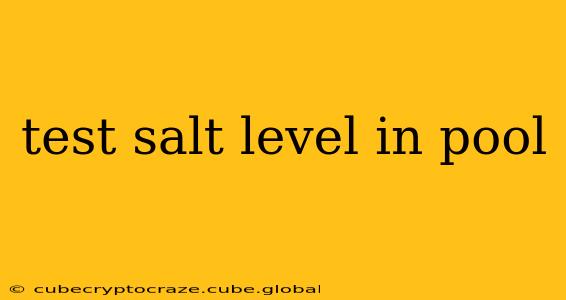Maintaining the perfect balance of salt in your saltwater pool is crucial for its cleanliness, the longevity of your equipment, and your overall swimming experience. Incorrect salt levels can lead to equipment malfunction, cloudy water, and even corrosion. This comprehensive guide will walk you through how to accurately test your pool's salt level and address common concerns.
What is the Ideal Salt Level for a Saltwater Pool?
The ideal salt level for a saltwater pool typically ranges from 2,700 to 3,500 parts per million (ppm). This range ensures effective sanitization by your saltwater chlorine generator while minimizing the risk of damage to your pool equipment. However, always consult your pool equipment manufacturer's instructions, as the optimal range can vary slightly depending on the specific model.
How to Test Your Pool's Salt Level: A Step-by-Step Guide
Testing your pool's salt level is a straightforward process that can be done with readily available test kits. Here's a step-by-step guide:
-
Gather your supplies: You'll need a salt test kit specifically designed for pools. These kits are widely available at pool supply stores and online retailers. Some test strips are less accurate than digital meters or test kits that require reagent drops. Accuracy matters significantly when adjusting salt levels!
-
Collect a sample: Collect a water sample from your pool in a clean container. Ensure the sample is taken from the middle of the pool, away from the walls and jets, to get a representative reading. Avoid collecting water from the skimmer, as the salt level may vary slightly there.
-
Follow the kit instructions: Carefully follow the instructions provided with your chosen test kit. This typically involves adding a reagent to the water sample and comparing the resulting color to a chart or using a digital meter.
-
Record your reading: Note down the salt level in ppm (parts per million). This reading will be crucial for determining whether adjustments are needed.
What Happens if My Pool's Salt Level is Too High or Too Low?
H2: What happens if my pool's salt level is too high?
A salt level that's too high can cause several issues:
- Equipment damage: Excessive salt can corrode your pool's equipment, including the chlorine generator, pump, and heater.
- Cloudy water: High salt concentration can lead to cloudy or hazy water.
- Irritation: High salinity can irritate your skin and eyes.
H2: What happens if my pool's salt level is too low?
A salt level that's too low can also result in problems:
- Ineffective sanitization: Your chlorine generator won't produce enough chlorine to sanitize the water effectively, potentially leading to algae growth and other water quality issues.
- Reduced lifespan of the chlorine generator: Low salt levels force the chlorine generator to work harder, potentially reducing its lifespan.
How to Adjust Your Pool's Salt Level
Once you've tested your pool's salt level, you can adjust it as needed. To increase the salt level, add pool-grade salt to the pool. Gradually add the salt to the pool, running the pump for several hours to ensure it dissolves completely and evenly. To lower the salt level, you unfortunately must partially drain and refill the pool, as removing salt is considerably more difficult than adding it. This is why accurate testing and gradual additions are key to prevent having to drain your pool.
How Often Should I Test My Pool's Salt Level?
It's recommended to test your pool's salt level at least once a month, or more frequently during periods of heavy use or after significant rainfall. Regular testing allows you to maintain the ideal salt level and prevent potential problems.
What are the different types of pool salt test kits?
There are several types of salt test kits available for pool owners:
- Test Strips: These are the least accurate but most convenient type of salt test kit.
- Liquid Test Kits: These kits offer more accuracy than test strips but still require some visual interpretation.
- Digital Salt Meters: Digital meters offer the highest degree of accuracy and require only a water sample to provide accurate readings.
By following these guidelines and regularly testing your pool's salt level, you can ensure a clean, healthy, and enjoyable swimming experience. Remember that consulting with a pool professional is always a good idea if you have any doubts or concerns about your pool's water chemistry.
